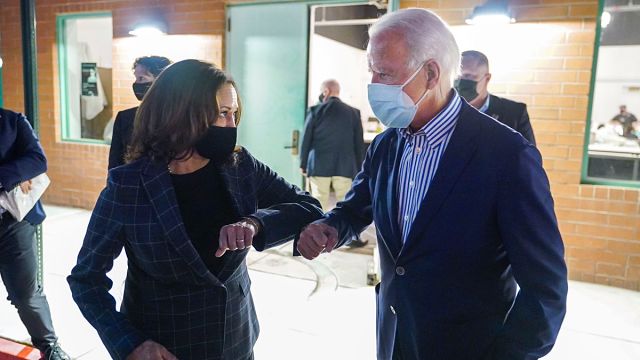 We are now only 22 days from the highly anticipated 2020 U.S. election. According to The Economist as of this week Biden has a 91% chance of winning the November 3rd presidential poll. Similarly Politico reports that "Joe Biden has reached 270 electoral votes for the first time since POLITICO’s Election Forecast debuted late last year." (Photo via Twitter @KamalaHarris)
We are now only 22 days from the highly anticipated 2020 U.S. election. According to The Economist as of this week Biden has a 91% chance of winning the November 3rd presidential poll. Similarly Politico reports that "Joe Biden has reached 270 electoral votes for the first time since POLITICO’s Election Forecast debuted late last year." (Photo via Twitter @KamalaHarris)
The Economist
BIDEN ’91% CHANCE’ OF WINNING
Right now, our model thinks Joe Biden is very likely to beat Donald Trump in the electoral college.

Estimated electoral college votes
Our model is updated every day and combines state and national polls with economic indicators to predict a range of outcomes. The midpoint is the estimate of the electoral-college vote for each party on election day.
Biden 347 — Trump 191
Electoral-college simulations
Our model works by simulating 20,000 paths for the election, each time varying candidates’ vote shares to account for polling error, changes in turnout or the political environment and the effects of campaigning. The bars below represent the predicted likelihood of every plausible electoral-vote outcome.
Biden wins 91% — Trump wins 9%
Key states
We use two metrics to measure states’ importance. One is the “tipping-point probability”: the chance that a state will cast the decisive 270th electoral vote for the victor. The other is the chance that any single voter in a state will cast the decisive ballot that wins the tipping-point state for the next president.
Biden is favored to win the election
Biden tops 270 in POLITICO’s Election Forecast
Joe Biden has reached 270 electoral votes for the first time since POLITICO’s Election Forecast debuted late last year.
In addition to a double-digit national lead, Biden has built a stable advantage in the three Great Lakes States that put Donald Trump over the top in 2016: Michigan, Pennsylvania and Wisconsin. Our latest presidential-race ratings now have Biden favored in enough states — including Wisconsin, which we’ve moved from “toss-up” to “lean Democratic”— to clinch the presidency.
To win reelection, Trump would now have to sweep all five toss-up states, plus pull back a “lean Democratic” state like Wisconsin or Pennsylvania.
Yet signs of a possible Democratic wave abound.
Biden’s national advantage is widening as Election Day approaches. Millions of Americans are voting every week and ballot return statistics indicate that Democratic voters are highly motivated. And, propelled by seemingly unlimited financial resources and Trump’s vulnerability at the top of the ticket, Democrats are now actively contesting Senate races in once-unthinkable states, like Alaska and South Carolina. The party could even pad its House majority, which includes more than two dozen seats that Trump carried four years ago.
POLITICO’s Election Forecast is based on extensive, year-long reporting: conversations with dozens of strategists, pollsters and campaigns, along with an analysis of public and private polling data and other data sources.
—
Related:
VP Debate Takeaways: Pandemic looms over a more civil fight
The Associated Press
WASHINGTON (AP) — In normal times, vice presidential debates don’t matter much. But in an election year as wild as 2020, everything is magnified.
Vice President Mike Pence on Wednesday faced considerable pressure to boost coronavirus-stricken President Donald Trump’s flagging reelection hopes as he trails in national and battleground state polls.
California Sen. Kamala Harris stepped on stage having to balance her role as Joe Biden’s validator with her own historic presence as the first Black woman on a major party national ticket.
The candidates were separated by plexiglass out of concern for spread of the coronavirus from cases emanating from the White House.
Here are key early takeaways from the only vice presidential debate ahead of the Nov. 3 Election Day.
DEBATE, UNINTERRUPTED … MOSTLY
Millions of Americans were aghast when Trump derailed the first presidential debate with incessant interruptions and a cascade of falsehoods, while Biden answered by calling the Republican incumbent a “clown” who needed to “shut up.”
The opening of Wednesday’s undercard matchup made clear that Pence and Harris were set for a much different encounter — an actual debate.
To be sure, there were sharp moments, some modest interruptions and violations of the debate clock. But the dynamics represented a rare 2020 return to some semblance of normal presidential politics.
Pence’s even temperament has been a signature of his political career and he has often served as a kind of translator for Trump’s bombast. Harris had a long career as a prosecutor, comfortable arguing her case under pressure. Both played to type.
In tone and content, their debate was like an alternate universe from the one Americans saw little more than a week ago.
PANDEMIC, UNABATED
The Trump campaign wants voters to focus on anything but the pandemic that has killed more than 210,000 people across the country and infected at least 7.5 million more. But that subject dominated from the outset, with Trump and a growing list of White House aides, campaign staff and allies now sidelined with COVID-19.
Harris immediately put Pence on the defensive, calling Trump’s pandemic response “the greatest failure of any presidential administration in the history of our country.” Trump and Pence “still don’t have a plan,” she said.
Pence shot back that much of Biden’s proposed coronavirus response is action the federal government already is taking. More clearly than Trump perhaps ever has done, Pence expressed sympathy for all those affected by the pandemic, and he accused Harris of “playing politics with people’s lives.” Harris has accused Trump of politicizing the vaccine development process.
In fact, Biden’s plan does have elements that Trump’s doesn’t. Biden has called for the president to issue a mask mandate on federal property and has urged governors and mayors to do the same. He has called for using other federal spending and regulatory power. But Harris skipped those details.
RACIAL POLITICS
One spoke proudly of joining racial justice protests; the other denied the existence of systemic racism.
Harris, the first Black woman on a presidential ticket, spoke passionately about “people around our country of every race, of every age, of every gender” who “marched, shoulder to shoulder, arm and arm, fighting for us to finally achieve that ideal of equal justice under law.”
Still, she said, “We are never going to condone violence.”
Pence, in contrast, proclaimed his trust for the justice system and put the focus on incidents of violence, saying there was “no excuse for the rioting and looting.”
And he argued that the idea that “America’s systemically racist” and that law enforcement has an implicit bias against minorities “is a great insult to the men and women” who serve in law enforcement.
SUPREME COURT ARGUMENT
Perhaps Pence’s most aggressive line of attack on Harris was pressing her for an answer on whether a Biden administration would “pack” the Supreme Court by adding liberal justices if they win the election. Harris didn’t take the bait, just as Biden hasn’t in recent weeks.
Pence clearly sees the court vacancy as a winning issue for the Republican ticket. He hailed Trump nominee Amy Coney Barrett, who would succeed the late liberal Justice Ruth Bader Ginsburg if she’s confirmed, as expected, before the election. At least twice, he spoke directly to voters warning that Biden and Democrats would expand the court if they “don’t get their way” on blocking Barrett.
Harris seemingly missed an opportunity to remind Pence and the audience that the court’s Republican lean comes because the GOP-led Senate in 2016 refused to consider President Barack Obama’s nominee in the spring of 2016, carrying over a vacancy that Trump filled in 2017. She did, however, invoke Abraham Lincoln, who declined to make a Supreme Court nomination less than a month before his reelection.
The senator did manage to turn Pence’s “pack the court” attack around by noting that Trump’s slate of federal court appointees has been overwhelmingly white. And she underscored Democrats’ argument and public polling that suggests most voters think the Senate should wait until after the election to fill the current Supreme Court vacancy.
HANDLING HISTORY
Harris was cautious about approaching the historic nature of her candidacy. She referenced thinking about her mother, an immigrant from India, on the day Biden invited her to join the Democratic ticket. But she stuck mostly to the talking points that any potential Democratic candidate could have offered.
Pence, on the other hand, embraced the opportunity to be magnanimous. “I also want to congratulate you … on the historic nature of your nomination,” Pence told Harris. “I never expected to be on that stage four years ago so I know the feeling.”
It was a grace note from Pence, something not heard from his boss the week before.
SO MUCH FOR THE QUESTIONS
There were many questions about specific subjects. There were many answers but not so much about those specific subjects.
Pence and Harris repeatedly dodged and sidestepped queries from debate moderator Susan Page, answering questions however they wanted.
The vice president danced around the Rose Garden Supreme Court ceremony last weekend that is now considered a spreader event and instead pivoted to platitudes about personal responsibility. He said he and the president “trust the American people to make choices” while accusing Harris of Biden of pushing mandates.
When both were asked whether they had discussed succession plans with their far older running mates in case they are incapacitated, Pence instead slammed Harris for her “continuous undermining of confidence in a vaccine” to fight the coronavirus.
Harris, meanwhile, used the question to share her biography, telling the story of her immigrant mother and her election as the first woman and the first Black person elected as attorney general in California.
MISSIONS ACCOMPLISHED
With the president’s poll numbers flagging since his manic debate performance and his infection with the coronavirus, Pence appeared to be on one mission: to stop the freefall.
Instead of speaking to on-the-fence independents or working to change the minds of undecided voters, Pence seemed intent on trying to keep the president’s base behind him.
Harris had a different burden because she is less well known. She introduced herself as credible and competent and likely assured Democratic voters that she is capable of stepping into the role of commander in chief if needed.
And she gamely defended Biden, another classic role for a vice president, broadly framing Trump’s tenure as a failure and Biden as suited to pick up the pieces.
THE FLIES HAVE IT
While the debate was comparatively tame, there were moments that stood out, especially on social media.
Most prominent were the two minutes when a fly rested on Pence’s well-combed white hair. Pence did not flinch. The internet exploded.
And the Biden campaign pounced, grabbing the internet domain flywillvote.com, tweeting it out from his account, and taking users to a site for voter registration and information.
—
Related:
WATCH: Michelle Obama’s Closing Argument | Joe Biden For President 2020
—
Election 2020 – The Youth Vote Event In Seattle
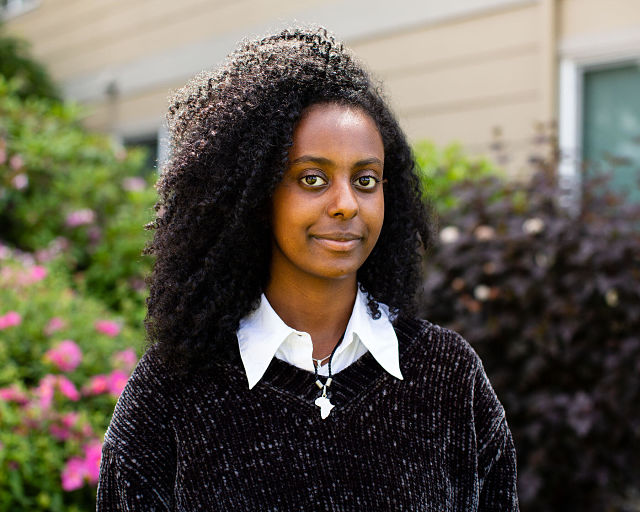
Bitaniya Giday, age 17, is the 2020-2021 Seattle Youth Poet Laureate. She is a first-generation Ethiopian American residing in Seattle. Bitaniya is one of the young interviewers in a timely upcoming Zoom event on October 14th titled “The Youth Vote: A conversation about leadership, ethics and values and how they factor into choosing a candidate.” (KNKX PUBLIC RADIO)
KNKX PUBLIC RADIO
Young people make up a projected 37% of the 2020 electorate, yet historically they vote less than other age groups. Will it be different this time? The pandemic crisis and the call for racial justice and institutional changes are top concerns as we move closer to this high stakes election. Ethics and values also underpin our decisions. This virtual event aims to bring together first-time and new voters with older adults with a track record of civic leadership to discuss a number of issues through the lens of beliefs and values, touching on things like:
What does it mean to be a leader?
In thorny situations, how do you speak for a community?
If there are three important issues facing your community and you only have enough resources to address one, how would you choose?
Because this is leading up to the general election, we want to frame this conversation around the power to change systems for the greater good and how that ties in with being an informed voter.
The six young interviewers will ask the four speakers questions relating to the themes of conflict/failure, challenges, accountability, transparency, priorities and representation, with the speakers drawing on their personal and professional experiences; and offering examples of how they have faced challenging situations and how that speaks to leadership and community building.
Young Interviewers
Bitaniya Giday, age 17, is the 2020-2021 Seattle Youth Poet Laureate. She is a first-generation Ethiopian American residing in Seattle. Her writing explores the nuances of womanhood and blackness, as she reflects upon her family’s path of immigration across the world. She hopes to restore and safeguard the past, present, and future histories of her people through traditional storytelling and poetry.
—
Related:
Ethiopian Americans Hold Virtual Town Hall Ahead of November Election
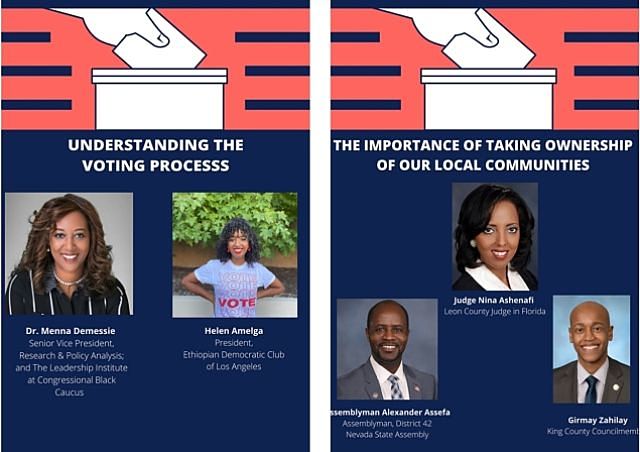
The nationwide town hall event, which will be held on Thursday, September 24th, 2020 plans to emphasize the importance of exercising our citizenship right to vote and to participate in the U.S. democratic process. The gathering will feature panel discussions, PSAs, and cultural engagements. (Courtesy photos)
Tadias Magazine
By Tadias Staff
Updated: September 23rd, 2020
Los Angeles (TADIAS) — Ethiopian Americans are holding a virtual town hall this week ahead of the November 3rd U.S. election.
The nationwide event, which will be held on Thursday, September 24th, will emphasize the importance of exercising our citizenship right to vote and to participate in the U.S. democratic process.
According to organizers the town hall — put together by the ‘Habeshas Vote’ initiative and the non-profit organization Habesha Networks — will feature various panel discussions, public service announcements and cultural engagements.
“We intend on discussing various subject matters related to civic engagement issues affecting our community at the moment,” the announcement notes, highlighting that by the end of the conference “participants will be able to understand the importance of taking ownership of our local communities, learn more about the voting process and gain a better [appreciation] of why we should all care about voting.”
Speakers include Helen Amelga, President of the Ethiopian Democratic Club of Los Angeles; Dr. Menna Demissie, Senior Vice President of Policy Analysis & Research at the Congressional Black Caucus Foundation; Assemblyman Alexander Assefa, the first Ethiopian American to be elected into office in the Nevada Legislature and the first Ethiopian American ever elected in the U.S. to a state-wide governing body; Judge Nina Ashenafi Richardson of Florida, who is the first Ethiopian-American judge in the United States who was re-elected to a third term this year; and Girmay Zahilay, Councilman in King County, Washington.

(Courtesy photos)
Additional presenters include: Andom Ghebreghiorgis. former Congressional candidate from New York; Samuel Gebru, former candidate for City Council in Cambridge, Massachusetts, and current managing director of Black Lion Strategies; as well as Hannah Joy Gebresilassie, journalist and community advocate; and Debbie Almraw, writer and poet.
Entertainment will be provided by Elias Aragaw, the artist behind @TheFunkIsReal, and DJ Sammy Sam.
The announcement notes that “voting is a core principle of being American, but to exercise this basic right we must be registered to vote! That’s why Habesha Networks and Habeshas Vote are proud partners of When We All Vote and supporters of National Voter Registration Day.”
—
Watch: Students Interview Kamala Harris (U.S. ELECTION UPDATE)
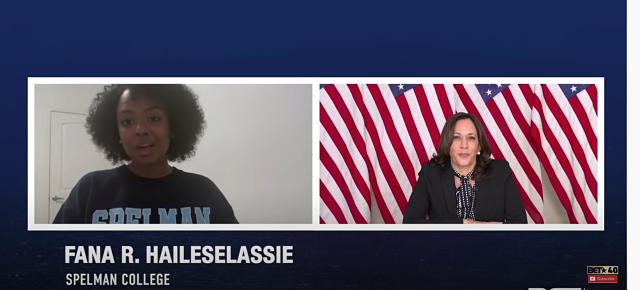
Fana R. Haileselassie, a student at Spelman College in Atlanta, asks Sen. Kamala Harris a question during a virtual Q&A hosted by BET featuring the Democratic nominee for Vice President and students discussing the interests of millennial voters. (Photo: BETNetworks)
BET News Special
HBCU Students Interview Kamala Harris
A virtual Q&A hosted by Terrence J featuring Democratic nominee for Vice President Sen. Kamala Harris and HBCU students discussing the interests of millennial voters.
Watch: Sen. Kamala Harris Answers HBCU Students’ Questions About Voting, Student Loan Debt & More
—
Related:
Virginia’s Era as a Swing State Appears to be Over
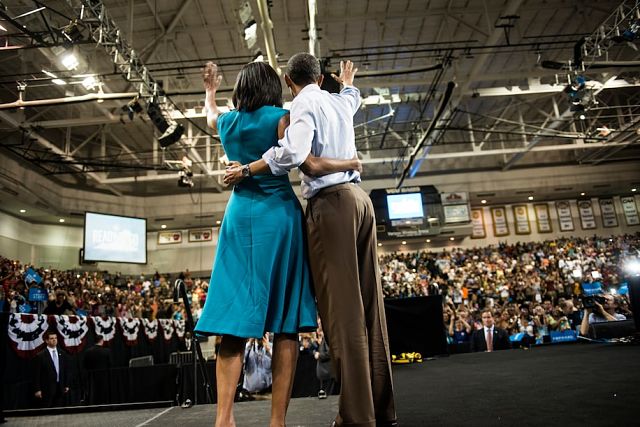
President Barack Obama and first lady Michelle Obama wave after a campaign event in May 2012 in Richmond. (Getty Images)
The Washington Post
Updated: September 18th, 2020
No TV ads, no presidential visits: Virginia’s era as a swing state appears to be over
Barack Obama held the very last rally of his 2008 campaign in Virginia, the longtime Republican stronghold he flipped on his way to the White House.
Four years later, Obama and Republican challenger Mitt Romney made more visits and aired more television ads here than nearly anywhere else. And in 2016, Donald Trump staged rally after rally in the Old Dominion while Hillary Clinton picked a Virginian as her running mate.
But Virginia isn’t getting the swing-state treatment this time around. As in-person early voting got underway Friday, President Trump and Democratic challenger Joe Biden were dark on broadcast television. Super PACs were clogging somebody else’s airwaves. Even as Trump and Biden have resumed limited travel amid the coronavirus pandemic, neither has stumped in the Old Dominion.
There’s really no discussion about the state being in play,” said Amy Walter, national editor of the nonpartisan Cook Political Report. “If you’re Ohio or New Hampshire, or Wisconsin, Pennsylvania, you’ve always been in that spotlight. Virginia got it for such a short period of time.”
The last time presidential candidates stayed out of Virginia and off its airwaves was 2004. The state was reliably red then, having backed Republicans for the White House every year since 1968. Now Virginia seems to be getting the cold shoulder because it’s considered solidly blue.
“Virginia was the belle of the ball in 2008, and again in 2012, and still once more in 2016, but in 2020, the commonwealth is a wall flower,” said Stephen Farnsworth, a University of Mary Washington political scientist.
—
Related:
Virginians come out in force to cast ballots on the first day of early voting
Mike Bloomberg to spend at least $100 million in Florida to benefit Joe Biden
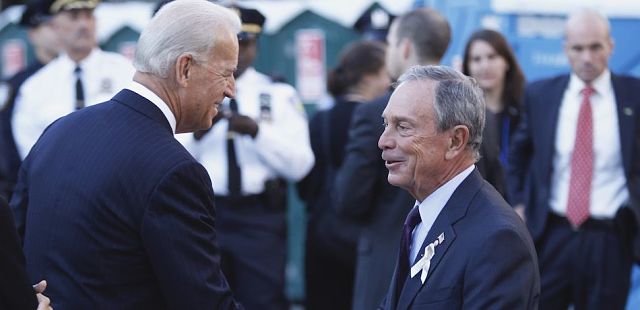
Former NYC mayor Mike Bloomberg plans to spend at least $100 million to help elect Joe Biden, a massive late-stage infusion of cash that could reshape the presidential contest. (Getty Images)
The Washington Post
Updated: September 13th, 2020
Former New York mayor Mike Bloomberg plans to spend at least $100 million in Florida to help elect Democrat Joe Biden, a massive late-stage infusion of cash that could reshape the presidential contest in a costly toss-up state central to President Trump’s reelection hopes.
Bloomberg made the decision to focus his final election spending on Florida last week, after news reports that Trump had considered spending as much as $100 million of his own money in the final weeks of the campaign, Bloomberg’s advisers said. Presented with several options on how to make good on an earlier promise to help elect Biden, Bloomberg decided that a narrow focus on Florida was the best use of his money.
The president’s campaign has long treated the state, which Trump now calls home, as a top priority, and his advisers remain confident in his chances given strong turnout in 2016 and 2018 that gave Republicans narrow winning margins in statewide contests.
Watch: Former 2020 presidential candidate Mike Bloomberg slammed Trump during his Democratic National Convention speech on Aug. 20.
Bloomberg’s aim is to prompt enough early voting that a pro-Biden result would be evident soon after the polls close.
—
Related:
Biden Leads by 9 Percentage Points in Pennsylvania (ELECTION UPDATE)

In the survey, Biden, who was born in the state, draws the support of 53 percent of likely voters, compared to 44 percent who back Trump. (Reuters photo)
The Washington Post
Updated: September 9, 2020
Biden Leads by 9 Percentage Points in Pennsylvania, Poll Finds
Joe Biden leads President Trump by nine percentage points among likely voters in Pennsylvania, a key battleground state that Trump narrowly won four years ago, according to a new NBC News-Marist poll.
In the survey, Biden, who was born in the state, draws the support of 53 percent of likely voters, compared to 44 percent who back Trump.
In 2016, Trump carried Pennsylvania by less than one percentage point over Democrat Hillary Clinton.
The NBC-Marist poll shows Biden getting a boost from suburban voters, who side with him by nearly 20 percentage points, 58 percent to 39 percent. In 2016, Trump won suburban voters in Pennsylvania by about eight points, according to exit polls.
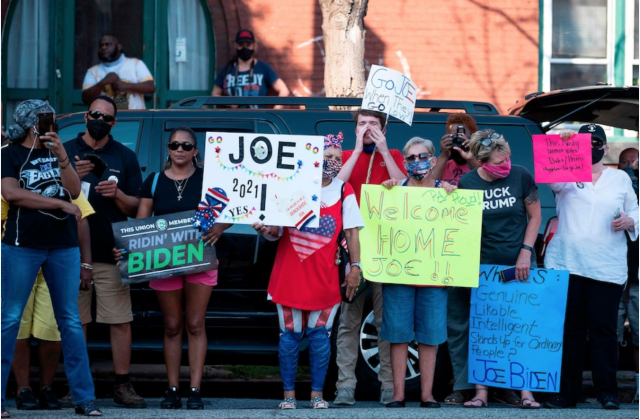
Supporters of Democratic presidential candidate Joe Biden stand outside the AFL-CIO headquarters in Harrisburg, Pa., on Monday. (Getty Images)
The poll also finds the candidates are tied at 49 percent among white voters in Pennsylvania, a group that Trump won by double digits in 2016. Biden leads Trump among nonwhite voters, 75 percent to 19 percent.
Pennsylvania has been a frequent destination for both campaigns in recent weeks. Vice President Pence has events scheduled there on Wednesday.
—
Kamala D. Harris Goes Viral — for Her Shoe Choice
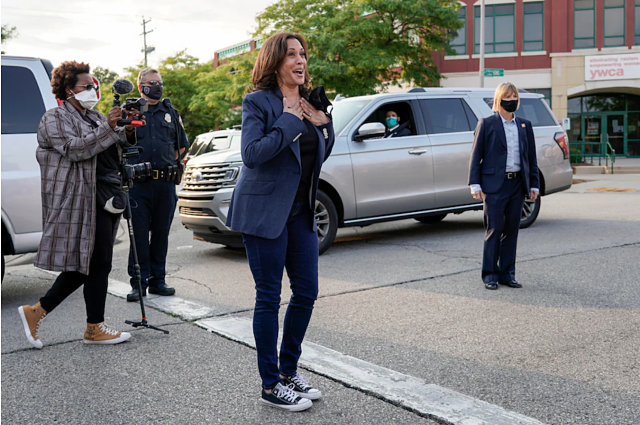
Sporting Chuck Taylor sneakers, Democratic vice-presidential candidate Sen. Kamala D. Harris (Calif.) greets supporters Monday in Milwaukee. (AP photo)
The Washington Post
Updated: September 8, 2020
It took roughly eight seconds of on-the-ground campaigning for the first Black woman to be nominated on a major party’s ticket to go viral.
At first glance, little seemed noteworthy as Sen. Kamala D. Harris deplaned in Milwaukee on Monday. She was wearing a mask. She didn’t trip. Instead, what sent video pinging around the Internet was what was on her feet: her black, low-rise Chuck Taylor All-Stars, the classic Converse shoe that has long been associated more closely with cultural cool than carefully managed high-profile candidacies.
By Tuesday morning, videos by two reporters witnessing her arrival had been viewed nearly 8 million times on Twitter — for comparison’s sake, more than four times the attention the campaign’s biggest planned video event, a conversation between Joe Biden and Barack Obama, had received on both Twitter and YouTube combined.
Harris’s sister, Maya, tweeted Monday that Chuck Taylors are, indeed, her sister’s “go-to.” A few hours later, Harris’s official campaign account tweeted the video with the caption “laced up and ready to win.”
Read more »
—
81 American Nobel Laureates Endorse Biden for Next U.S. President
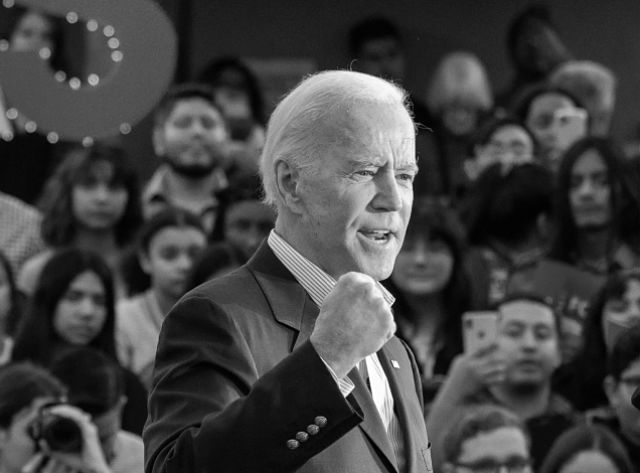
The Nobel laureates in physics, chemistry and medicine “wholeheartedly” endorsed the Democratic nominee in an open letter released Wednesday. “At no time in our nation’s history has there been a greater need for our leaders to appreciate the value of science in formulating public policy,” they said. (Courtesy photo)
Press Release
Nobel Laureates endorse Joe Biden
81 American Nobel Laureates in Physics, Chemistry, and Medicine have signed this letter to express their support for former Vice President Joe Biden in the 2020 election for President of the United States.
At no time in our nation’s history has there been a greater need for our leaders to appreciate the value of science in formulating public policy. During his long record of public service, Joe Biden has consistently demonstrated his willingness to listen to experts, his understanding of the value of international collaboration in research, and his respect for the contribution that immigrants make to the intellectual life of our country.
As American citizens and as scientists, we wholeheartedly endorse Joe Biden for President.
Name, Category, Prize Year:
Peter Agre Chemistry 2003
Sidney Altman Chemistry 1989
Frances H. Arnold Chemistry 2018
Paul Berg Chemistry 1980
Thomas R. Cech Chemistry 1989
Martin Chalfie Chemistry 2008
Elias James Corey Chemistry 1990
Joachim Frank Chemistry 2017
Walter Gilbert Chemistry 1980
John B. Goodenough Chemistry 2019
Alan Heeger Chemistry 2000
Dudley R. Herschbach Chemistry 1986
Roald Hoffmann Chemistry 1981
Brian K. Kobilka Chemistry 2012
Roger D. Kornberg Chemistry 2006
Robert J. Lefkowitz Chemistry 2012
Roderick MacKinnon Chemistry 2003
Paul L. Modrich Chemistry 2015
William E. Moerner Chemistry 2014
Mario J. Molina Chemistry 1995
Richard R. Schrock Chemistry 2005
K. Barry Sharpless Chemistry 2001
Sir James Fraser Stoddart Chemistry 2016
M. Stanley Whittingham Chemistry 2019
James P. Allison Medicine 2018
Richard Axel Medicine 2004
David Baltimore Medicine 1975
J. Michael Bishop Medicine 1989
Elizabeth H. Blackburn Medicine 2009
Michael S. Brown Medicine 1985
Linda B. Buck Medicine 2004
Mario R. Capecchi Medicine 2007
Edmond H. Fischer Medicine 1992
Joseph L. Goldstein Medicine 1985
Carol W. Greider Medicine 2009
Jeffrey Connor Hall Medicine 2017
Leland H. Hartwell Medicine 2001
H. Robert Horvitz Medicine 2002
Louis J. Ignarro Medicine 1998
William G. Kaelin Jr. Medicine 2019
Eric R. Kandel Medicine 2000
Craig C. Mello Medicine 2006
John O’Keefe Medicine 2014
Michael Rosbash Medicine 2017
James E. Rothman Medicine 2013
Randy W. Schekman Medicine 2013
Gregg L. Semenza Medicine 2019
Hamilton O. Smith Medicine 1978
Thomas C. Sudhof Medicine 2013
Jack W. Szostak Medicine 2009
Susumu Tonegawa Medicine 1987
Harold E. Varmus Medicine 1989
Eric F. Wieschaus Medicine 1995
Torsten N. Wiesel Medicine 1981
Michael W. Young Medicine 2017
Barry Clark Barish Physics 2017
Steven Chu Physics 1997
Jerome I. Friedman Physics 1990
Sheldon Glashow Physics 1979
David J. Gross Physics 2004
John L. Hall Physics 2005
Wolfgang Ketterle Physics 2001
J. Michael Kosterlitz Physics 2016
Herbert Kroemer Physics 2000
Robert B. Laughlin Physics 1998
Anthony J. Leggett Physics 2003
John C. Mather Physics 2006
Shuji Nakamura Physics 2014
Douglas D. Osheroff Physics 1996
James Peebles Physics 2019
Arno Penzias Physics 1978
Saul Perlmutter Physics 2011
H. David Politzer Physics 2004
Brian P. Schmidt Physics 2011
Joseph H. Taylor Jr. Physics 1993
Kip Stephen Thorne Physics 2017
Daniel C. Tsui Physics 1998
Rainer Weiss Physics 2017
Frank Wilczek Physics 2004
Robert Woodrow Wilson Physics 1978
David J. Wineland Physics 2012
—
Related
Biden Calls Trump ‘a Toxic Presence’ Who is Encouraging Violence in America
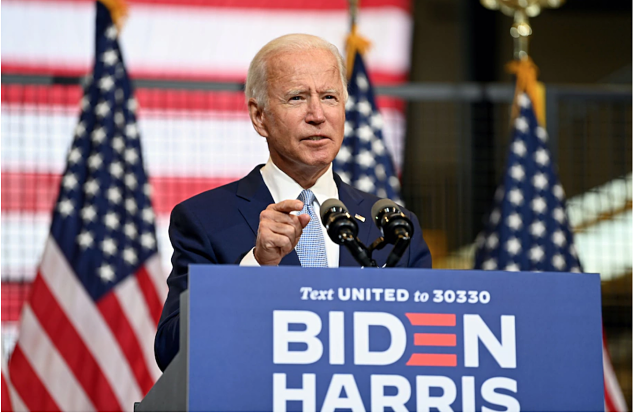
“Donald Trump has been a toxic presence in our nation for four years,” Biden said. “Will we rid ourselves of this toxin? (Photo: Joe Biden speaks Monday in Pittsburgh/Reuters)
The Washington Post
Joe Biden excoriated President Trump on Monday as a threat to the safety of all Americans, saying he has encouraged violence in the nation’s streets even as he has faltered in handling the coronavirus pandemic.
For his most extensive remarks since violent protests have escalated across the country in recent days, Biden traveled to Pittsburgh and struck a centrist note, condemning both the destruction in the streets and Trump for creating a culture that he said has exacerbated it.
“I want to be very clear about all of this: Rioting is not protesting. Looting is not protesting. Setting fires is not protesting,” Biden said. “It’s lawlessness, plain and simple. And those who do it should be prosecuted.”
The former vice president also rejected the caricature that Trump and his allies have painted of him as someone who holds extremist views and has helped fuel the anger in urban centers across the country.
“You know me. You know my heart. You know my story, my family’s story,” Biden said. “Ask yourself: Do I look like a radical socialist with a soft spot for rioters? Really?”
While the speech was delivered amid heightened tensions over race and police conduct, Biden did not outline new policies, instead focusing on making a broader condemnation of Trump.
He called the president a danger to those suffering from the coronavirus, to anyone in search of a job or struggling to pay rent, to voters worried about Russian interference in the upcoming election and to those worried about their own safety amid unrest.
“Donald Trump wants to ask the question: Who will keep you safer as president? Let’s answer that question,” Biden said. “When I was vice president, violent crime fell 15 percent in this country. We did it without chaos and disorder.”
Pointing to a nationwide homicide rate rising 26 percent this year, Biden asked, “Do you really feel safer under Donald Trump?”
“If I were president today, the country would be safer,” Biden said. “And we’d be seeing a lot less violence.”
It was a marked shift for Biden from his convention speech less than two weeks ago, in which he never named Trump in his remarks. During his speech Monday, he mentioned Trump’s name 32 times.
“Donald Trump has been a toxic presence in our nation for four years,” Biden said. “Will we rid ourselves of this toxin? Or will we make it a permanent part of our nation’s character?”
—
Spotlight: The Unravelling of the Social Fabric in Ethiopia and the U.S.
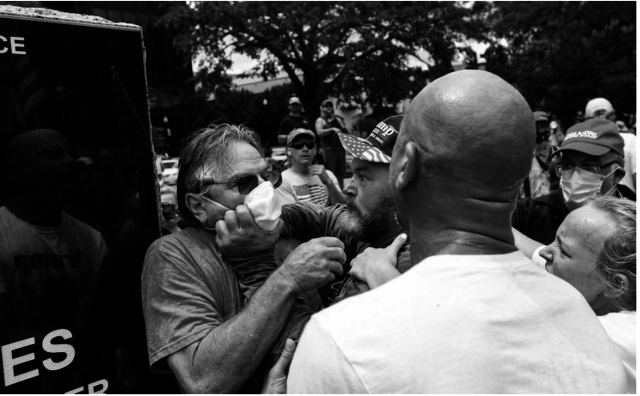
As Ethiopian Americans we are increasingly concerned about the decline of civil discourse and the unravelling of the social fabric not only in Ethiopia, but also here in the United States where in the era of Trump and the COVID-19 pandemic politics has also become more and more violent. Below are excerpts and links to two recent articles from The Intercept and The Guardian focusing on the timely topic. (AP photo)
The Intercept
August, 29th, 2020
The Social Fabric of the U.S. Is Fraying Severely, if Not Unravelling: Why, in the world’s richest country, is every metric of mental health pathology rapidly worsening?
THE YEAR 2020 has been one of the most tumultuous in modern American history. To find events remotely as destabilizing and transformative, one has to go back to the 2008 financial crisis and the 9/11 and anthrax attacks of 2001, though those systemic shocks, profound as they were, were isolated (one a national security crisis, the other a financial crisis) and thus more limited in scope than the multicrisis instability now shaping U.S. politics and culture.
Since the end of World War II, the only close competitor to the current moment is the multipronged unrest of the 1960s and early 1970s: serial assassinations of political leaders, mass civil rights and anti-war protests, sustained riots, fury over a heinous war in Indochina, and the resignation of a corruption-plagued president.
But those events unfolded and built upon one another over the course of a decade. By crucial contrast, the current confluence of crises, each of historic significance in their own right — a global pandemic, an economic and social shutdown, mass unemployment, an enduring protest movement provoking increasing levels of violence and volatility, and a presidential election centrally focused on one of the most divisive political figures the U.S. has known who happens to be the incumbent president — are happening simultaneously, having exploded one on top of the other in a matter of a few months.
Lurking beneath the headlines justifiably devoted to these major stories of 2020 are very troubling data that reflect intensifying pathologies in the U.S. population — not moral or allegorical sicknesses but mental, emotional, psychological and scientifically proven sickness. Many people fortunate enough to have survived this pandemic with their physical health intact know anecdotally — from observing others and themselves — that these political and social crises have spawned emotional difficulties and psychological challenges…
Much attention is devoted to lamenting the toxicity of our discourse, the hate-driven polarization of our politics, and the fragmentation of our culture. But it is difficult to imagine any other outcome in a society that is breeding so much psychological and emotional pathology by denying to its members the things they most need to live fulfilling lives.
Read the full article at theintercept.com »
—
Ethiopia falls into violence a year after leader’s Nobel peace prize win
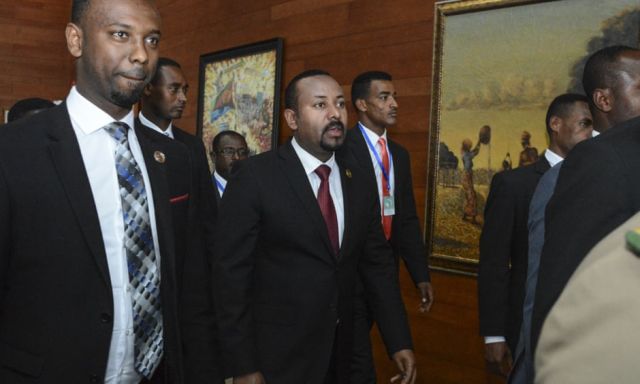
Ethiopia’s prime minister, Abiy Ahmed, centre, arrives at an African Union summit in Addis Ababa in July. Photograph: AP
By Jason Burke and Zecharias Zelalem in Addis Ababa
Sat 29 Aug 2020
Abiy Ahmed came to power promising radical reform, but 180 people have died amid ethnic unrest in Oromia state
Ethiopia faces a dangerous cycle of intensifying internal political dissent, ethnic unrest and security crackdowns, observers have warned, after a series of protests in recent weeks highlighted growing discontent with the government of Abiy Ahmed, a Nobel peace prize winner.
Many western powers welcomed the new approach of Abiy, who took power in 2018 and promised a programme of radical reform after decades of repressive one-party rule, hoping for swift changes in an emerging economic power that plays a key strategic role in a region increasingly contested by Middle Eastern powers and China. He won the peace prize in 2019 for ending a conflict with neighbouring Eritrea.
The most vocal unrest was in the state of Oromia, where there have been waves of protests since the killing last month of a popular Oromo artist and activist, Haacaaluu Hundeessaa, in Addis Ababa, the capital. An estimated 180 people have died in the violence, some murdered by mobs, others shot by security forces. Houses, factories, businesses, hotels, cars and government offices were set alight or damaged and several thousand people, including opposition leaders, were arrested.
Further protests last week prompted a new wave of repression and left at least 11 dead. “Oromia is still reeling from the grim weight of tragic killings this year. These grave patterns of abuse should never be allowed to continue,” said Aaron Maasho, a spokesperson for the Ethiopian Human Rights Commission.
—
Related:
‘How Dare We Not Vote?’ Black Voters Organize After DC March
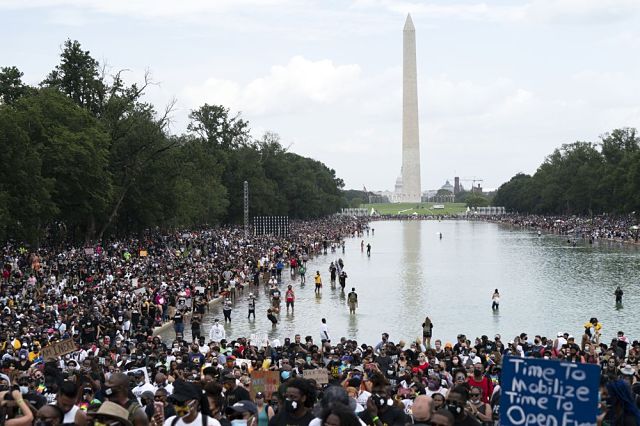
People rally at Lincoln Memorial during the March on Washington, Friday Aug. 28, 2020, on the 57th anniversary of the Rev. Martin Luther King Jr.’s “I Have A Dream” speech. Speakers implored attendees to “vote as if our lives depend on it.” (AP Photos)
The Associated Press
Updated: August 29th, 2020
WASHINGTON (AP) — Tears streamed down Brooke Moreland’s face as she watched tens of thousands gather on the steps of the Lincoln Memorial to decry systemic racism and demand racial justice in the wake of several police killings of Black Americans.
But for the Indianapolis mother of three, the fiery speeches delivered Friday at the commemoration of the 1963 March on Washington for Jobs and Freedom also gave way to one central message: Vote and demand change at the ballot box in November.
“As Black people, a lot of the people who look like us died for us to be able to sit in public, to vote, to go to school and to be able to walk around freely and live our lives,” the 31-year-old Moreland said. “Every election is an opportunity, so how dare we not vote after our ancestors fought for us to be here?”
That determination could prove critical in a presidential election where race is emerging as a flashpoint. President Donald Trump, at this past week’s Republican National Convention, emphasized a “law and order” message aimed at his largely white base of supporters. His Democratic rival, Joe Biden, has expressed empathy with Black victims of police brutality and is counting on strong turnout from African Americans to win critical states such as North Carolina, Florida, Pennsylvania and Michigan.
“If we do not vote in numbers that we’ve never ever seen before and allow this administration to continue what it is doing, we are headed on a course for serious destruction,” Martin Luther King III, told The Associated Press before his rousing remarks, delivered 57 years after his father’s famous “I Have A Dream” speech. “I’m going to do all that I can to encourage, promote, to mobilize and what’s at stake is the future of our nation, our planet. What’s at stake is the future of our children.”
As the campaign enters its latter stages, there’s an intensifying effort among African Americans to transform frustration over police brutality, systemic racism and the disproportionate toll of the coronavirus into political power. Organizers and participants said Friday’s march delivered a much needed rallying cry to mobilize.
As speakers implored attendees to “vote as if our lives depend on it,” the march came on the heels of yet another shooting by a white police officer of a Black man – 29-year-old Jacob Blake in Kenosha, Wisconsin, last Sunday — sparking demonstrations and violence that left two dead.
“We need a new conversation … you act like it’s no trouble to shoot us in the back,” the Rev. Al Sharpton said. “Our vote is dipped in blood. We’re going to vote for a nation that stops the George Floyds, that stops the Breonna Taylors.”
Navy veteran Alonzo Jones- Goss, who traveled to Washington from Boston, said he plans to vote for Biden because the nation has seen far too many tragic events that have claimed the lives of Black Americans and other people of color.
“I supported and defended the Constitution and I support the members that continue to do it today, but the injustice and the people that are losing their lives, that needs to end,” Jones-Goss, 28, said. “It’s been 57 years since Dr. King stood over there and delivered his speech. But what is unfortunate is what was happening 57 years ago is still happening today.”
Drawing comparisons to the original 1963 march, where participants then were protesting many of the same issues that have endured, National Urban League President and CEO Marc Morial said it’s clear why this year’s election will be pivotal for Black Americans.
“We are about reminding people and educating people on how important it is to translate the power of protest into the power of politics and public policy change,” said Morial, who spoke Friday. “So we want to be deliberate about making the connection between protesting and voting.”
Nadia Brown, a Purdue University political science professor, agreed there are similarities between the situation in 1963 and the issues that resonate among Black Americans today. She said the political pressure that was applied then led to the Voting Rights Act of 1965 and other powerful pieces of legislation that transformed the lives of African Americans. She’s hopeful this could happen again in November and beyond.
“There’s already a host of organizations that are mobilizing in the face of daunting things,” Brown said. “Bur these same groups that are most marginalized are saying it’s not enough to just vote, it’s not enough for the Democratic Party or the Republican Party to ask me for my vote. I’m going to hold these elected officials that are in office now accountable and I’m going to vote in November and hold those same people accountable. And for me, that is the most uplifting and rewarding part — to see those kind of similarities.”
But Brown noted that while Friday’s march resonated with many, it’s unclear whether it will translate into action among younger voters, whose lack of enthusiasm could become a vulnerability for Biden.
“I think there is already a momentum among younger folks who are saying not in my America, that this is not the place where they want to live, but will this turn into electoral gains? That I’m less clear on because a lot of the polling numbers show that pretty overwhelmingly, younger people, millennials and Gen Z’s are more progressive and that they are reluctantly turning to this pragmatic side of politics,” Brown said.
That was clear as the Movement for Black Lives also marked its own historic event Friday — a virtual Black National Convention that featured several speakers discussing pressing issues such as climate change, economic empowerment and the need for electoral justice.
“I don’t necessarily see elections as achieving justice per se because I view the existing system itself as being fundamentally unjust in many ways and it is the existing system that we are trying to fundamentally transform,” said Bree Newsome Bass, an activist and civil rights organizer, during the convention’s panel about electoral justice. “I do think voting and recognizing what an election should be is a way to kind of exercise that muscle.”
—
Biden, Harris Prepare to Travel More as Campaign Heats Up (Election Update)
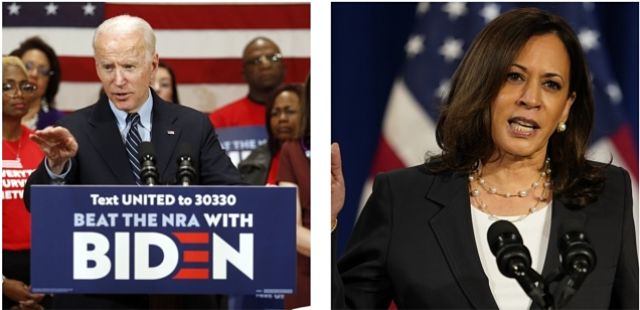
Democratic presidential candidate, former Vice President Joe Biden and vice presidential candidate Sen. Kamala Harris. (AP Photos)
The Associated Press
August 28th, 2020
WASHINGTON (AP) — After spending a pandemic spring and summer tethered almost entirely to his Delaware home, Joe Biden plans to take his presidential campaign to battleground states after Labor Day in his bid to unseat President Donald Trump.
No itinerary is set, according to the Democratic nominee’s campaign, but the former vice president and his allies say his plan is to highlight contrasts with Trump, from policy arguments tailored to specific audiences to the strict public health guidelines the Biden campaign says its events will follow amid COVID-19.
That’s a notable difference from a president who on Thursday delivered his nomination acceptance on the White House lawn to more than 1,000 people seated side-by-side, most of them without masks, even as the U.S. death toll surpassed 180,000.
“He will go wherever he needs to go,” said Biden’s campaign co-chairman Cedric Richmond, a Louisiana congressman. “And we will do it in a way the health experts would be happy” with and “not the absolutely irresponsible manner you saw at the White House.”
Richmond said it was “always the plan” for Biden and his running mate Kamala Harris to travel more extensively after Labor Day, the traditional mark of the campaign’s home stretch when more casual voters begin to pay close attention.
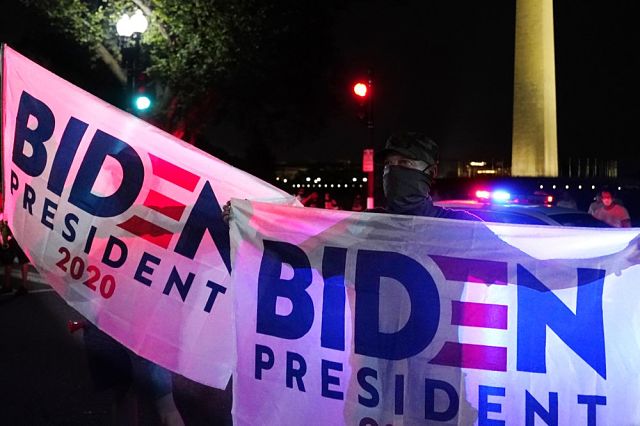
Biden supporters hold banners near the White House on the fourth day of the Republican National Convention, Thursday evening, Aug. 27, 2020, in Washington, while Donald Trump delivers his acceptance speech from the nearby White House South Lawn.(AP Photo)
Biden has conducted online fundraisers, campaign events and television interviews from his home, but traveled only sparingly for speeches and roundtables with a smattering of media or supporters. His only confirmed plane travel was to Houston, where he met with the family of George Floyd, the Black man who was killed by a white Minneapolis police officer on May 25, sparking nationwide protests. Even some Democrats worried quietly that Biden was ceding too much of the spotlight to Trump. But Biden aides have defended their approach. “We will never make any choices that put our staff or voters in harm’s way,” campaign manager Jen O’Malley Dillon said in May.
Throughout his unusual home-based campaign, Biden blasted Trump as incompetent and irresponsible for downplaying the pandemic and publicly disputing the government’s infectious disease experts. Richmond said that won’t change as Biden ramps up travel.
“We won’t beat this pandemic, which means we can’t restore the economy and get people’s lives back home, unless we exercise some discipline and lead by example,” Richmond said, adding that Trump is “incapable of doing it.”
As exhibited by his acceptance speech Thursday, Trump is insistent on as much normalcy as possible, even as he’s pulled back from his signature indoor rallies after drawing a disappointing crowd in Tulsa, Oklahoma on June 20. Trump casts Biden as wanting to “shut down” the economy to combat the virus. “Joe Biden’s plan is not a solution to the virus, but rather a surrender,” Trump declared on the White House lawn. Biden, in fact, has not proposed shutting down the economy. He’s said only that he would be willing to make such a move as president if public health experts advise it. The Democrat also has called for a national mask mandate, calling it a necessary move for Americans to protect each other. Harris on Friday talked about the idea in slightly different terms than Biden, acknowledging that a mandate would be difficult to enforce.
“It’s really a standard. I mean, nobody’s gonna be punished. Come on,” the California senator said, laughing off a question about how to enforce such a rule during an interview that aired Friday on “Today.” “Nobody likes to wear a mask. This is a universal feeling. Right? So that’s not the point, ’Hey, let’s enjoy wearing masks.′ No.”
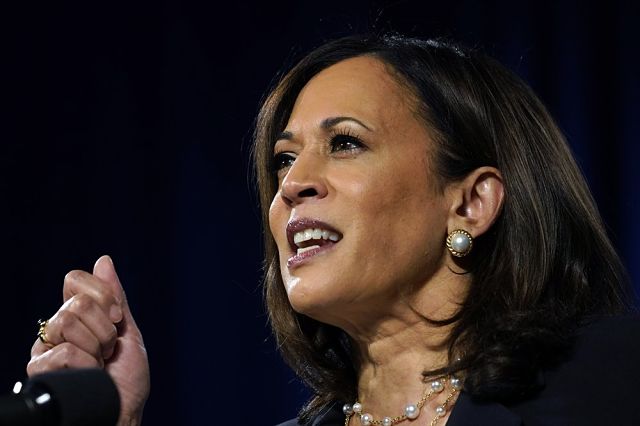
Democratic vice presidential candidate Sen. Kamala Harris, D-Calif., speaks in Washington, Thursday, Aug. 27, 2020. (AP Photo)
Harris suggested that, instead, the rule would be about “what we — as responsible people who love our neighbor — we have to just do that right now.”
“God willing, it won’t be forever,” she added.
Biden and Harris have worn protective face masks in public and stayed socially distanced from each other when appearing together at campaign events. Both have said for weeks that a rule requiring all Americans to wear them could save 40,000 lives in just a three-month period. While such an order may be difficult to impose at the federal level, Biden has called on every governor in the country to order mask-wearing in their states, which would likely achieve the same goal.
Trump has urged Americans to wear masks but opposes a national requirement and personally declined to do so for months. He has worn a mask occasionally more recently, but not at any point Thursday at the Republican National Convention’s closing event, which violated the District of Columbia’s guidelines prohibiting large gatherings.
—
Related:
Joe Biden Claims the Democratic Presidential Nomination
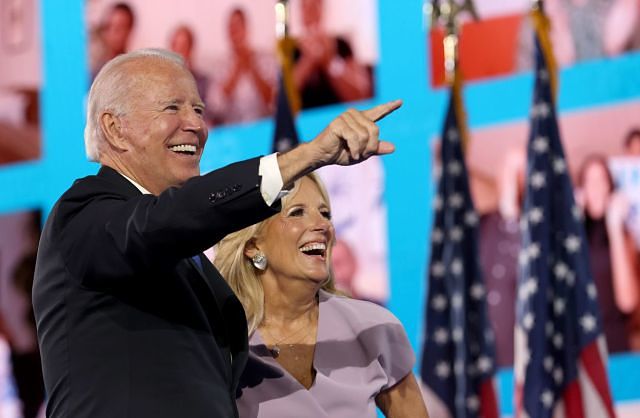
Former U.S. Vice President Joe Biden accepted the 2020 Democratic presidential nomination on Thursday evening during the last day of the historic Democratic National Convention, August 20, 2020. (AP photo)
The Washington Post
Updated: August 21st, 2020
Biden speaks about ‘battle for the soul of this nation,’ decries Trump’s leadership
Joe Biden accepted his party’s presidential nomination, delivering a speech that directly criticized the leadership of Trump on matters of the coronavirus pandemic, the economy and racial justice.
“Here and now, I give you my word: If you entrust me with the presidency, I will draw on the best of us, not the worst. I’ll be an ally of the light, not the darkness,” Biden said, calling on Americans to come together to “overcome this season of darkness.”
The night featured tributes to civil rights activist and congressman John Lewis, who died in July, as well as to Beau Biden, Joe Biden’s son who died in 2015.
—
Kamala Harris Accepts Historic Nomination for Vice President of the United States
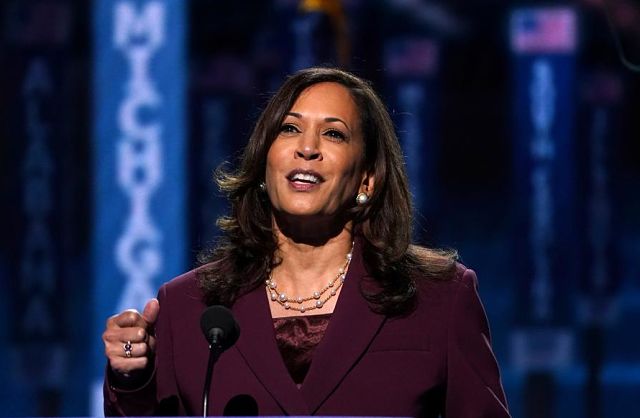
Sen. Kamala D. Harris (D-Calif.) accepted her party’s historic nomination to be its vice-presidential candidate in the 2020 U.S. election on Wednesday evening during the third day of the Democratic National Convention. (Reuters photo)
Reuters
Updated: August 20th, 2020
Kamala Harris makes U.S. history, accepts Democrats’ vice presidential nod
WASHINGTON (Reuters) – U.S. Senator Kamala Harris accepted the Democratic nomination for vice president on Wednesday, imploring the country to elect Joe Biden president and accusing Donald Trump of failed leadership that had cost lives and livelihoods.
The first Black woman and Asian-American on a major U.S. presidential ticket, Harris summarized her life story as emblematic of the American dream on the third day of the Democratic National Convention.
“Donald Trump’s failure of leadership has cost lives and livelihoods,” Harris said.
Former U.S. President Barack Obama told the convention Trump’s failures as his successor had led to 170,000 people dead from the coronavirus, millions of lost jobs and America’s reputation badly diminished in the world.
The evening featured a crush of women headliners, moderators and speakers, with Harris pressing the case against Trump, speaking directly to millions of women, young Americans and voters of color, constituencies Democrats need if Biden is to defeat the Republican Trump.
“The constant chaos leaves us adrift, the incompetence makes us feel afraid, the callousness makes us feel alone. It’s a lot. And here’s the thing: we can do better and deserve so much more,” she said.
“Right now, we have a president who turns our tragedies into political weapons. Joe will be a president who turns our challenges into purpose,” she said, speaking from an austere hotel ballroom in Biden’s hometown of Wilmington, Delaware.
Biden leads Trump in opinion polls ahead of the Nov. 3 election, bolstered by a big lead among women voters. Throughout the convention, Democrats have appealed directly to those women voters, highlighting Biden’s co-sponsorship of the landmark Violence Against Woman Act of 1994 and his proposals to bolster childcare and protect family healthcare provisions.
Obama, whose vice president was Biden from 2009-2017, said he had hoped that Trump would take the job seriously, come to feel the weight of the office, and discover a reverence for American democracy.
Obama on Trump: ‘Trump hasn’t grown into the job because he can’t’
“Donald Trump hasn’t grown into the job because he can’t. And the consequences of that failure are severe,” Obama said in unusually blunt criticism from an ex-president.
“Millions of jobs gone. Our worst impulses unleashed, our proud reputation around the world badly diminished, and our democratic institutions threatened like never before,” Obama said.
The choice of a running mate has added significance for Biden, 77, who would be the oldest person to become president if he is elected. His age has led to speculation he will serve only one term, making Harris a potential top contender for the nomination in 2024.
Biden named Harris, 55, as his running mate last week to face incumbents Trump, 74, and Vice President Mike Pence, 61.
Former first lady and U.S. Secretary of State Hillary Clinton, the 2016 Democratic presidential nominee who lost to Trump, told the convention she constantly hears from voters who regret backing Trump or not voting at all.
“This can’t be another woulda coulda shoulda election.” Clinton said. “No matter what, vote. Vote like our lives and livelihoods are on the line, because they are.”
Clinton, who won the popular vote against Trump but lost in the Electoral College, said Biden needs to win overwhelmingly, warning he could win the popular vote but still lose the White House.
“Joe and Kamala can win by 3 million votes and still lose,” Clinton said. “Take it from me. So we need numbers overwhelming so Trump can’t sneak or steal his way to victory.”
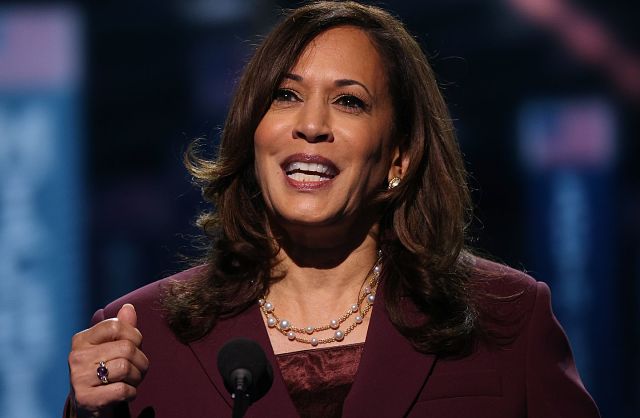
U.S. Senator Kamala Harris (D-CA) accepts the Democratic vice presidential nomination during an acceptance speech delivered for 2020 Democratic National Convention from the Chase Center in Wilmington, Delaware, U.S., August 19, 2020. (Getty Images)
Democrats have been alarmed by Trump’s frequent criticism of mail-in voting, and by cost-cutting changes at the U.S. Postal Service instituted by Postmaster General Louis DeJoy, a Trump supporter, that could delay mail during the election crunch. DeJoy said recently he would delay those changes until after the election.
Democrats also broadcast videos highlighting Trump’s crackdown on immigration, opposition to gun restrictions and his decision to pull out of the Paris climate accord.
‘DISRESPECT’ FOR FACTS, FOR WOMEN
Nancy Pelosi, the first woman Speaker of the U.S. House of Representatives, told the convention she had seen firsthand Trump’s “disrespect for facts, for working families, and for women in particular – disrespect written into his policies toward our health and our rights, not just his conduct. But we know what he doesn’t: that when women succeed, America succeeds.”
U.S. Senator Elizabeth Warren, a leading progressive who ran against Biden in the 2020 primary, spoke to the convention from a childcare center in Massachusetts and cited Biden’s proposal to make childcare more affordable as a vital part of his agenda to help working Americans.
“It’s time to recognize that childcare is part of the basic infrastructure of this nation — it’s infrastructure for families,” she said. “Joe and Kamala will make high-quality childcare affordable for every family, make preschool universal, and raise the wages for every childcare worker.”
In her speech later, Harris will have an opportunity to outline her background as a child of immigrants from India and Jamaica who as a district attorney, state attorney general, U.S. senator from California and now vice-presidential candidate shattered gender and racial barriers.
She gained prominence in the Senate for her exacting interrogations of Trump nominees, Supreme Court Justice Brett Kavanaugh and Attorney General Bill Barr.
The Republican National Convention, also largely virtual, takes place next week.
—
Democrats Officially Nominate Joe Biden to Become the Next U.S. President
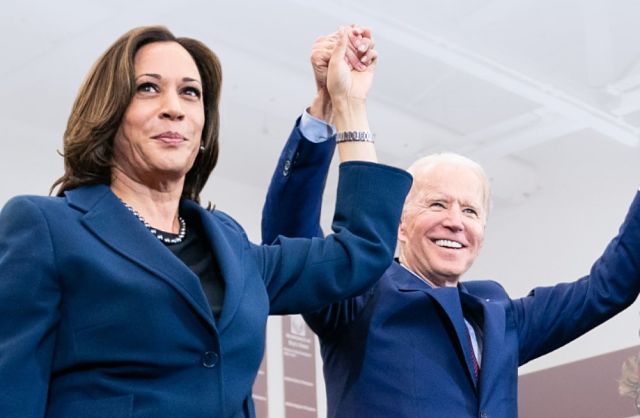
It’s official: Joe Biden is now formally a candidate to become the next President of the United States. Democrats officially nominated Biden as their 2020 candidate on Tuesday with a roll-call vote of delegates representing all states in the country during the second day of party’s historic virtual convention. (Photo: Courtesy of the Biden campaign)
The Associated Press
Updated: August 19th, 2020
Democrats make it official, nominate Biden to take on Trump
NEW YORK (AP) — Democrats formally nominated Joe Biden as their 2020 presidential nominee Tuesday night, as party officials and activists from across the nation gave the former vice president their overwhelming support during his party’s all-virtual national convention.
The moment marked a political high point for Biden, who had sought the presidency twice before and is now cemented as the embodiment of Democrats’ desperate desire to defeat President Donald Trump this fall.
The roll call of convention delegates formalized what has been clear for months since Biden took the lead in the primary elections’ chase for the nomination. It came as he worked to demonstrate the breadth of his coalition for a second consecutive night, this time blending support from his party’s elders and fresher faces to make the case that he has the experience and energy to repair chaos that Trump has created at home and abroad.
Former President Bill Clinton and former Secretary of State John Kerry — and former Republican Secretary of State Colin Powell — were among the heavy hitters on a schedule that emphasized a simple theme: Leadership matters. Former President Jimmy Carter, now 95 years old, also made an appearance.
“Donald Trump says we’re leading the world. Well, we are the only major industrial economy to have its unemployment rate triple,” Clinton said. “At a time like this, the Oval Office should be a command center. Instead, it’s a storm center. There’s only chaos.”
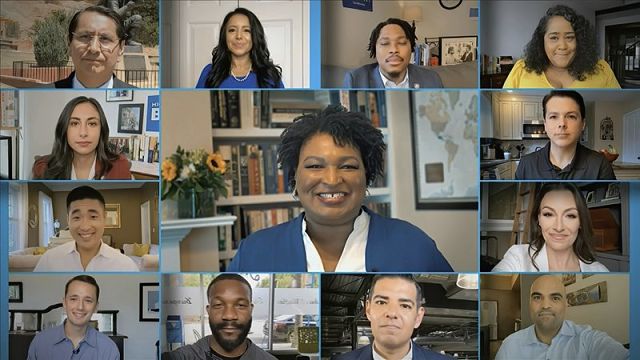
In this image from video, former Georgia House Democratic leader Stacey Abrams, center, and others, speak during the second night of the Democratic National Convention on Tuesday, Aug. 18, 2020. (Democratic National Convention via AP)
Biden formally captured his party’s presidential nomination Tuesday night after being nominated by three people, including two Delaware lawmakers and 31-year-old African American security guard who became a viral sensation after blurting out “I love you” to Biden in a New York City elevator.
Delegates from across the country then pledged their support for Biden in a video montage that featured Democrats in places like Alabama’s Edmund Pettis Bridge, a beach in Hawaii and the headwaters of the Mississippi River.
In the opening of the convention’s second night, a collection of younger Democrats, including former Georgia lawmaker Stacey Abrams and New York Rep. Alexandria Ocasio-Cortez, were given a few minutes to shine.
“In a democracy, we do not elect saviors. We cast our ballots for those who see our struggles and pledge to serve,” said Abrams, 46, who emerged as a national player during her unsuccessful bid for governor in 2018 and was among those considered to be Biden’s running mate.
She added: “Faced with a president of cowardice, Joe Biden is a man of proven courage.”
On a night that Biden was formally receiving his party’s presidential nomination, the convention was also introducing his wife, Jill Biden, to the nation as the prospective first lady.
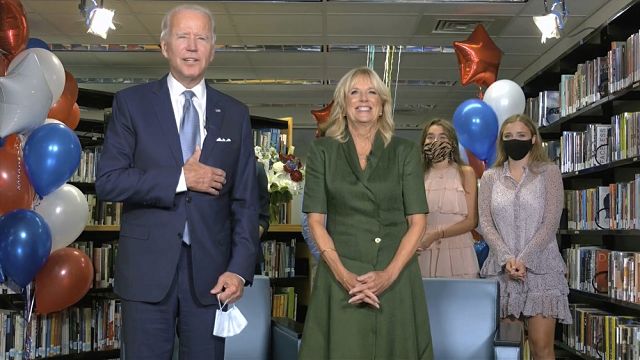
In this image from video, Democratic presidential candidate former Vice President Joe Biden, his wife Jill Biden, and members of the Biden family, celebrate after the roll call during the second night of the Democratic National Convention on Tuesday, Aug. 18, 2020. (Democratic National Convention via AP)
Biden is fighting unprecedented logistical challenges to deliver his message during an all-virtual convention this week as the coronavirus epidemic continues to claim hundreds of American lives each day and wreaks havoc on the economy.
The former vice president was becoming his party’s nominee as a prerecorded roll call vote from delegates in all 50 states airs, and the four-day convention will culminate on Thursday when he accepts that nomination. His running mate, California Sen. Kamala Harris, will become the first woman of color to accept a major party’s vice presidential nomination on Wednesday.
Until then, Biden is presenting what he sees as the best of his sprawling coalition to the American electorate in a format unlike any other in history.
For a second night, the Democrats featured Republicans.
Powell, who served as secretary of state under George W. Bush and appeared at multiple Republican conventions in years past, was endorsing the Democratic candidate. In a video released ahead of his speech, he said, “Our country needs a commander in chief who takes care of our troops in the same way he would his own family. For Joe Biden, that doesn’t need teaching.”
Powell joins the widow of the late Arizona Sen. John McCain, Cindy McCain, who was expected to stop short of a formal endorsement but talk about the mutual respect and friendship her husband and Biden shared.
While there have been individual members of the opposing party featured at presidential conventions before, a half dozen Republicans, including the former two-term governor of Ohio, have now spoken for Democrat Biden.
No one on the program Tuesday night has a stronger connection to the Democratic nominee than his wife, Jill Biden, a longtime teacher, was speaking from her former classroom at Brandywine High School near the family home in Wilmington, Delaware.
“You can hear the anxiety that echoes down empty hallways. There’s no scent of new notebooks or freshly waxed floors,” she said of the school in excerpts of her speech before turning to the nation’s challenges at home. “How do you make a broken family whole? The same way you make a nation whole. With love and understanding—and with small acts of compassion. With bravery. With unwavering faith.”
The Democrats’ party elders played a prominent role throughout the night.
Clinton, who turns 74 on Tuesday, hasn’t held office in two decades. Kerry, 76, was the Democratic presidential nominee back in 2004 when the youngest voters this fall were still in diapers. And Carter is 95 years old.
Clinton, a fixture of Democratic conventions for nearly three decades, addressed voters for roughly five minutes in a speech recorded at his home in Chappaqua, New York.
In addition to railing against Trump’s leadership, Clinton calls Biden “a go-to-work president.” Biden, Clinton continued, is “a man with a mission: to take responsibility, not shift the blame; concentrate, not distract; unite, not divide.”…
Kerry said in an excerpt of his remarks, “Joe understands that none of the issues of this world — not nuclear weapons, not the challenge of building back better after COVID, not terrorism and certainly not the climate crisis — none can be resolved without bringing nations together.”
—
Democrats Kick Off Convention as Poll Show Biden, Harris With Double-Digit Lead
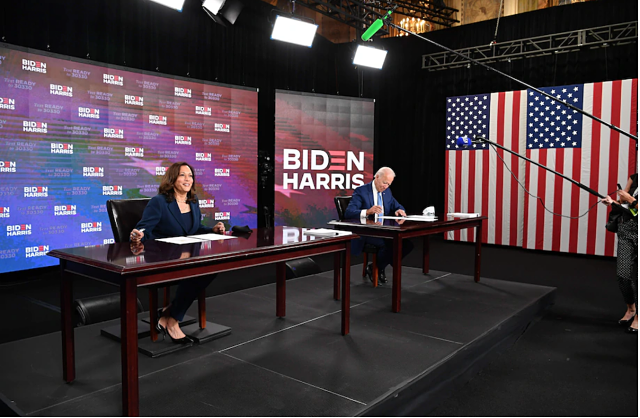
Democrats kicked off their historic virtual convention on Monday with the keynote speaker former first lady Michelle Obama assailing the current president as unfit and warning Americans not to reelect him for a second term. Meanwhile new poll show Biden, Harris with double-digit lead over Trump. (Getty Images)
The Associated Press
Updated: August 18th, 2020
Michelle Obama assails Trump as Democrats open convention
NEW YORK (AP) — Michelle Obama delivered a passionate broadside against President Donald Trump during Monday’s opening night of the Democratic National Convention, assailing the Republican president as unfit for the job and warning that the nation’s mounting crises would only get worse if he’s reelected.
The former first lady issued an emotional call to the coalition that sent her husband to the White House, declaring that strong feelings must be translated into votes.
“Donald Trump is the wrong president for our country,” she declared. “He has had more than enough time to prove that he can do the job, but he is clearly in over his head. He cannot meet this moment. He simply cannot be who we need him to be for us.”
Obama added: “If you think things possibly can’t get worse, trust me, they can and they will if we don’t make a change in this election.”
The comments came as Joe Biden introduced the breadth of his political coalition to a nation in crisis Monday night at the convention, giving voice to victims of the coronavirus pandemic, the related economic downturn and police violence and featuring both progressive Democrats and Republicans united against Trump’s reelection.
Former first lady Michelle Obama speaks during the first night of the Democratic National Convention on Monday, Aug. 17, 2020. The DNC released excerpts of her speech ahead of the convention start. (Democratic National Convention)
The ideological range of Biden’s many messengers was demonstrated by former presidential contenders from opposing parties: Vermont Sen. Bernie Sanders, a self-described democratic socialist who championed a multi-trillion-dollar universal health care plan, and Ohio’s former Republican Gov. John Kasich, an anti-abortion conservative who spent decades fighting to cut government spending.
The former vice president won’t deliver his formal remarks until Thursday night, but he made his first appearance just half an hour into Monday’s event as he moderated a panel on racial justice, a theme throughout the night, as was concern about the Postal Service. The Democrats accuse Trump of interfering with the nation’s mail in order to throw blocks in front of mail-in voting.
“My friends, I say to you, and to everyone who supported other candidates in this primary and to those who may have voted for Donald Trump in the last election: The future of our democracy is at stake. The future of our economy is at stake. The future of our planet is at stake,” Sanders declared.
Kasich said his status as a lifelong Republican “holds second place to my responsibility to my country.”
“In normal times, something like this would probably never happen, but these are not normal times,” he said of his participation at the Democrats’ convention. He added: “Many of us can’t imagine four more years going down this path.”
—
Post-ABC poll shows Biden, Harris hold double-digit lead over Trump, Pence
The race for the White House tilts toward the Democrats, with former vice president Joe Biden holding a double-digit lead nationally over President Trump amid continuing disapproval of the president’s handling of the coronavirus pandemic, according to a Washington Post-ABC News poll.
Democrats [kicked] off their convention on Monday in a mood of cautious optimism, with Biden and his running mate, Sen. Kamala D. Harris (D-Calif.), leading Trump and Vice President Pence by 53 percent to 41 percent among registered voters. The findings are identical among a larger sample of all voting-age adults.
Biden’s current national margin over Trump among voters is slightly smaller than the 15-point margin in a poll taken last month and slightly larger than a survey in May when he led by 10 points. In late March, as the pandemic was taking hold in the United States, Biden and Trump were separated by just two points, with the former vice president holding a statistically insignificant advantage.
Today, Biden and Harris lead by 54 percent to 43 percent among those who say they are absolutely certain to vote and who also report voting in 2016. A month ago, Biden’s lead of 15 points overall had narrowed to seven points among similarly committed 2016 voters. Biden now also leads by low double-digits among those who say they are following the election most closely.
—
Team Joe Announces Convention Speakers
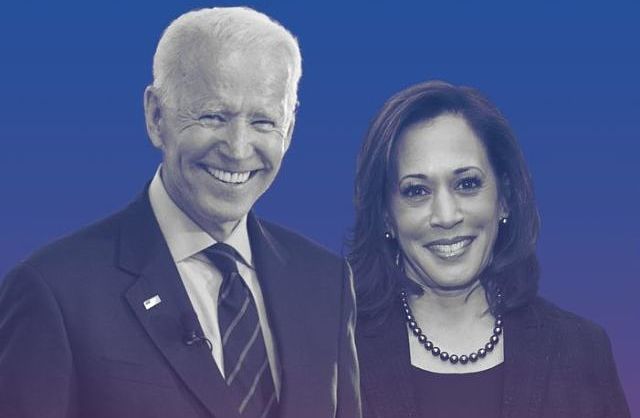
Joe Biden, the presumptive Democratic presidential nominee, and his running mate, US Senator Kamala Harris. (Courtesy Photo)
Tadias Magazine
By Tadias Staff
Updated: August 17th, 2020
New York (TADIAS) — Joe Biden’s campaign has announced its speaker lineup for the Democratic National Convention that’s set to open on Monday, August 17th in Milwaukee, Wisconsin.
Below are the list of speakers that will be featured “across all four nights of the Convention which will air live August 17-20 from 9:00-11:00 PM Eastern each night.”
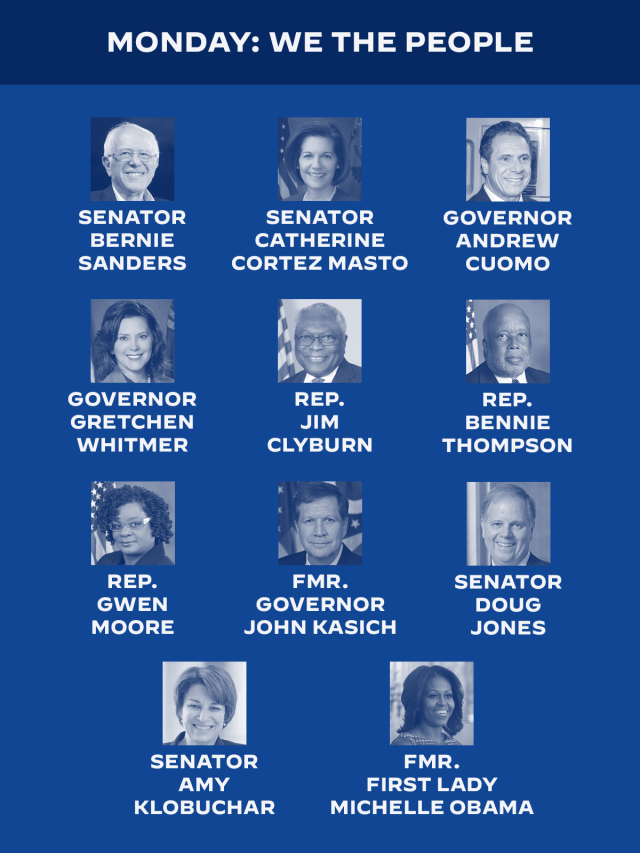
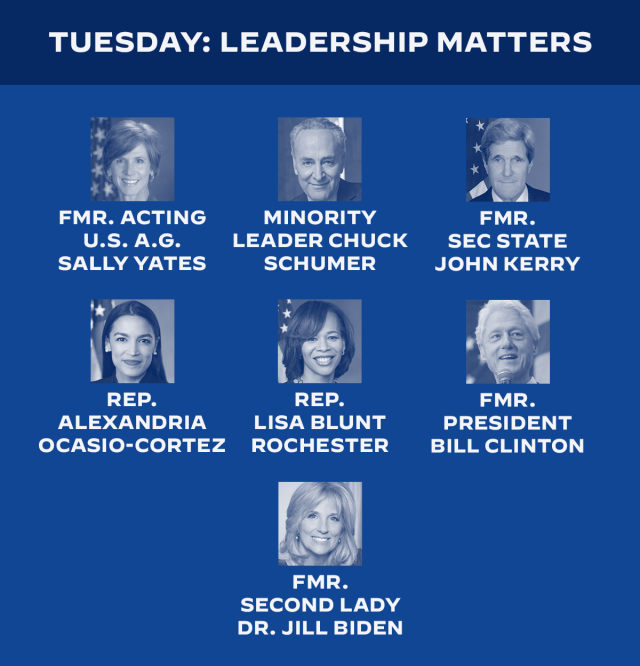
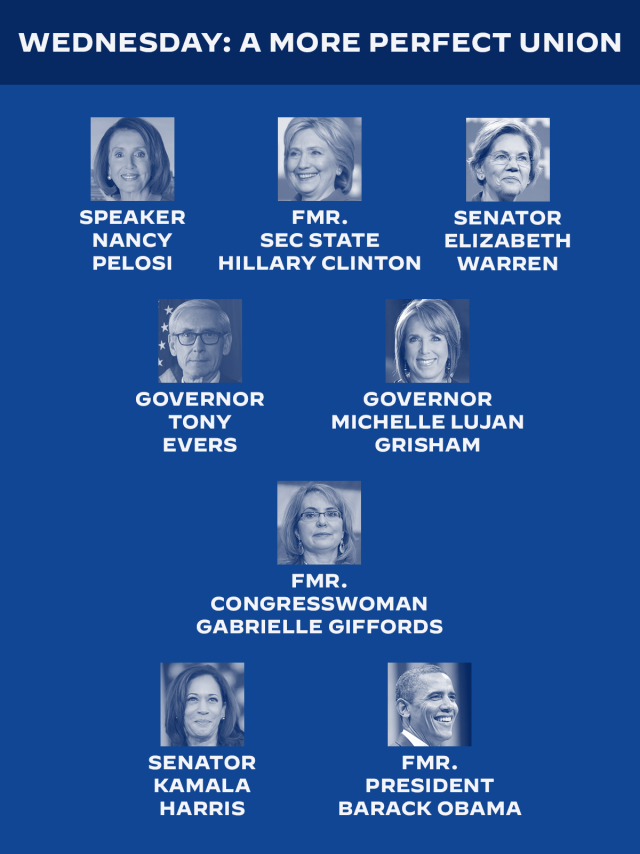
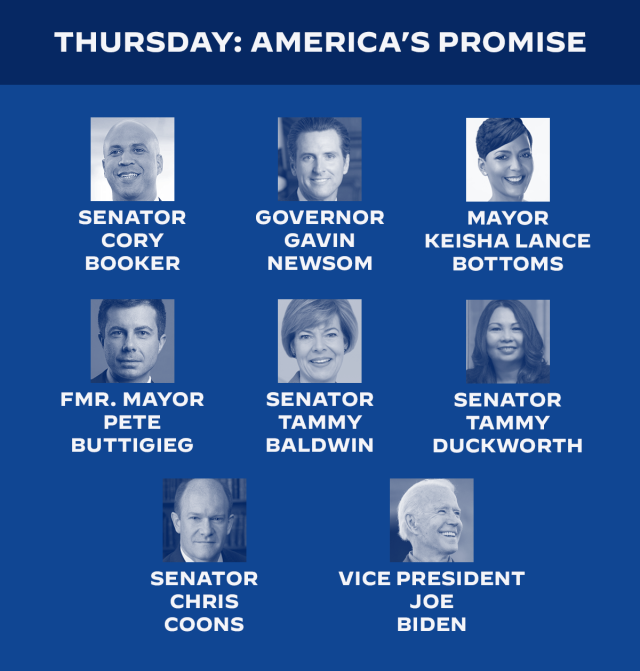
—
Related:
‘ሴቷ ኦባማ?’: Kamala Harris Faces Culture of Sexism & Misogyny in Ethiopian Media
Interview With Addisu Demissie: Senior Adviser to Joe Biden
Biden Selects Yohannes Abraham as Member of Transition Team
Join the conversation on Twitter and Facebook.

























